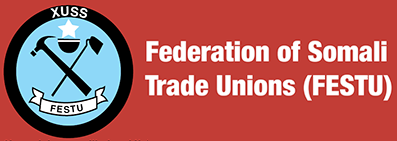On this World Day for Decent Work (7 October 2021), the Federation of Somali Trade Unions (FESTU), joins the global rallying call for decent work and better working conditions that ensure dignity, adequate wages, social protection, workers’ rights and working environments that encourage growth, professional development and aspirational thinking.
With Somalia struggling under a 73% poverty rate and 13% unemployment rate, millions of Somalis have lost all hope of securing employment let alone decent jobs. Those few who are lucky to attain this are mostly engaged in precarious work.
“Work is one of the fundamental pillars to a meaningful life and as an organisation primarily concerned with the welfare of workers, we yearn to see more Somalis in unemployment,” says Omar Faruk Osman, FESTU’s General Secretary. “However, this should not be at any cost. We call for decent work and living wages as opposed to working conditions that are substandard and work that exploits the limited options open to Somalis.”
An estimated 1.4 billion people work in vulnerable or informal employment. The status quo remains unacceptable – that to survive, many Somalis are forced to accept low incomes, and little or no job security. The majority of employers in Somalia knowingly and unknowingly are underpaying their workers and resort to using casual labour in a bid to evade paying workers their full benefits, and even ignoring their duty of care, leaving workers with no job security.
With the economic fragility intensified by COVID-19, thousands of workers in almost every region go to work every day with no guarantee of receiving their wages. For those that do, these earnings may not allow them to make ends meet.
Such realities continuously keep workers in Somalia on the breadline, vulnerable and unable to transition into better opportunities. At a national level, this retains or increases the levels of poverty and inequality in the country, disabling Somalia from moving towards a better and more equitable economic and social future.
Youth unemployment was at an unacceptable 19.82% in 2019. This represents a threat to Somalia’s growth, stability and security as young people who are unable to find decent work are at risk of being recruited into militia groups. Young people will eventually be handed the political, social and economic batons that will take Somalia into the future. Therefore, ensuring they are equipped and empowered with the correct skills and decent employment experience is critical.
Somali youth becoming familiar with decent work, decent salaries and working conditions that champion human rights, is integral to fostering stability in Somalia.
FESTU and its affiliated unions continue to demand better and safer working conditions for women. The pay gap between men and women remains a stain on Somalia and the world at large. Women continue to be relegated and over-represented in particular and lower-paying industries and face numerous barriers to promotion and professional success.
With childcare and domestic responsibilities still largely falling on women, FESTU calls for better employment policies and a more gender-aware work culture that recognises and adequately remunerates women for their tireless economic contribution to society.
“It is time for employers in this country to recognise the changing structures of families and the role that women may play as main breadwinners in the family,” says Osman. “We condemn violence and harassment against women workers both at the workplace and in the society, and FESTU calls for swift and effective domestication of ILO convention 190 on Violence and Harassment which Somalia ratified”.
For all the reasons above, FESTU strongly and unequivocally calls for Somalia’s Decent Work Country Programme to be finalised, adopted and implemented. In this way, Somalia can fully benefit from the ILO’s Decent Work Agenda, with emphasis on decent employment, workers’ rights and social protection. These elements are necessary for Somalia to attain peace, security and development and make reasonable progress towards the Sustainable Development Goals (SDG).
Let us use this special international day to reflect on the need for decent work opportunities that delivers, at minimum, fair income, job security and inclusive economic growth, the foundations for Somalis to dream big and imagine better and more prosperous futures for themselves and their families.
